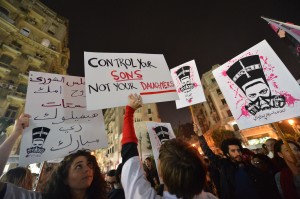
Dozens of demonstrators gathered in Talaat Harb Square in Downtown Cairo on Tuesday as part of a global protest against sexual harassment in Egypt.
The protestors, predominantly female, brandished signs decrying sexual harassment and assault on the streets of Cairo as well as banners opposing President Mohamed Morsi and the Muslim Brotherhood.
“Harassment won’t help you, think about it and we’ll cut off your hand”, and “Egyptian women and girls are a red line”, were frequent chants, as were those directed against Islamist rule such as “They [Islamists] say a woman’s voice is shameful, but a woman’s voice is that of revolution”.
Protestors also chanted against the Shura Council, the upper house of parliament. Members of parliament recently blamed women for rape and sexual assault targeting female protesters, suggesting they should not have been at the protests in the first place.
Prominent female activist Shahinda Maklad was seen at the protest.
Protests in solidarity with the cause were scheduled in 24 other cities in Egypt and around the world in front of Egyptian embassies such as Khartoum, Melbourne, Amsterdam, and New York.
“We, citizens of all nationalities all around the world, will not watch in silence the spreading epidemic of sexual terrorism. We want to show our support, solidarity and admiration for the assaulted who paid the price of the ongoing Egyptian revolution with their own flesh, and to the heroic volunteers who are risking their lives for a safe Tahrir,” said the call for the protest, which was made by the Uprising of Women in the Arab World movement.
The movement held the Freedom and Justice Party (FJP), the ruling party in Egypt and the Muslim Brotherhood’s political wing, responsible for not taking measures to halt the spread of “sexual terrorism” against female protesters. They also held the police and other governmental institutions responsible for failing to protect women.
“We hold responsible the Egyptian police and governmental institutions for not offering the necessary protection and safety to female Egyptian citizens. Not only that, but the police itself practises the crime of sexual harassment/assault,” the movement’s call to protest said.
Revolutionary groups and political parties need to condemn and take measures against sexual harassment and assault, the call added.
Sexual harassment and assault has been an endemic phenomenon on Egyptian streets for the past decade. Over 80% of Egyptian women say they have been subjected to some form of sexual harassment.
The practice has been employed by police and government assailants against female activists in protests since 2005.
On 11 February 2011, as hundreds of thousands celebrated the ousting of former President Hosni Mubarak in Cairo’s Tahrir Square, a mob of men attacked and sexually assaulted CBS journalist Lara Logan.
A recent surge in sexual assaults on women in Tahrir Square during protests has prompted the founding of activist groups such as Tahrir Bodyguard and Operation Anti Sexual Harassment that aim to protect women from mass sexual assaults.


